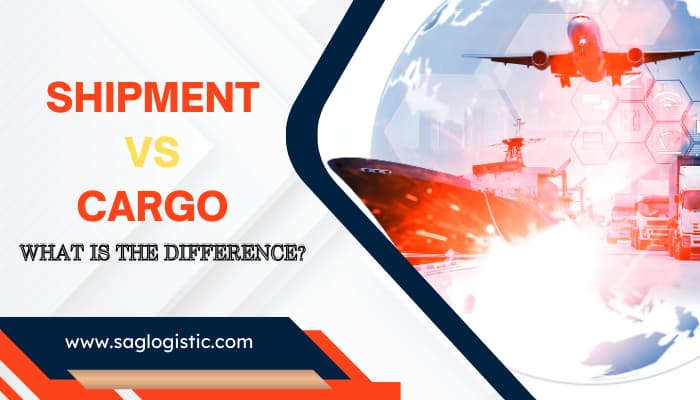
Shipment vs Cargo: What is the Difference?
Although the phrases “shipment” and “cargo” are frequently used synonymously in the logistics and transportation sector, they have different connotations and ramifications. Businesses must comprehend the difference between shipment and cargo in order to effectively manage the difficulties associated with goods forwarding and transportation. We explore the subtleties of shipment vs cargo in this extensive guide, outlining the main differences and business implications.
Table of Contents
What is Shipment?
The term “shipment” describes the products or commodities that are moved from one place to another. It includes every step of the cargo transportation process, from the place of origin to the destination. A shipment can take many different forms and sizes, from little packages to big containers or even bulk goods. Whether it’s transporting products to customers or transferring inventory between warehouses, shipments play a pivotal role in supply chain management.
What is Cargo?
Contrarily, cargo is the term used to describe the products or commerce that are being moved using a variety of vehicles, including trucks, trains, airplanes, and ships. Raw materials, completed commodities, machinery, and consumer goods are just a few examples of the diverse items that might be considered cargo. Unlike shipment, which refers to the entire consignment of goods, cargo specifically pertains to the goods themselves and their transportation.
Understanding the Difference Between Shipment and Cargo
The main difference between shipment and cargo is their meaning and extent. Cargo expressly refers to the products being transported, whereas shipment refers to the full process of conveying things. Here’s a breakdown of the key differences between shipment and cargo –
1. Scope
Shipment
Shipment encompasses the entire logistical process involved in transporting goods from one location to another. This comprehensive scope includes activities such as packaging, labeling, documentation, transportation arrangement, and final delivery to the intended destination. From the moment goods are prepared for shipment to their arrival at the recipient’s doorstep, every stage falls under the purview of shipment management.
Cargo
Contrarily, cargo explicitly refers to the material items or merchandise that are being conveyed. It focuses solely on the actual items being shipped, irrespective of the logistical processes involved. Cargo denotes the physical goods that are loaded onto ships, airplanes, trucks, or trains for transportation. A vast range of tangible commodities are included in the term “cargo,” including raw materials, completed goods, machinery, and consumer goods.
2. Nature
Shipment
Shipment is a broader and more inclusive term that encompasses both tangible goods and intangible items. In addition to physical merchandise, shipments may also involve intangible items such as documents, parcels, or digital files. This expansive nature of shipment reflects its role as a comprehensive logistical process that caters to diverse transportation needs.
Cargo
Conversely, cargo strictly refers to tangible goods or merchandise that are transported via various modes of transportation. Unlike shipment, which encompasses both tangible and intangible items, cargo specifically pertains to physical commodities that are loaded onto transportation vehicles for shipment. Whether it’s bulk cargo in containers or individual packages, cargo denotes the physical aspect of goods transportation.
3. Implications
Shipment Management
Shipment management entails overseeing the logistical aspects of transporting goods, encompassing a wide range of responsibilities and tasks. This includes coordinating with carriers, selecting appropriate transportation modes, arranging for customs clearance, ensuring compliance with regulations, tracking shipments in real-time, and facilitating timely delivery to the designated recipients. Shipment management requires meticulous planning, coordination, and execution to ensure the smooth flow of goods throughout the entire transportation process.
Cargo Management
Cargo management focuses on the handling, storage, and transportation of the actual goods themselves, emphasizing their safe and secure delivery to the designated destination. This involves loading and unloading cargo from transportation vehicles, ensuring proper packaging and labeling, implementing safety measures to prevent damage or loss, optimizing cargo storage facilities, and maintaining inventory accuracy. Cargo management plays a crucial role in safeguarding the integrity of goods during transit and facilitating their efficient movement from origin to destination.
Why Understanding the Difference Matters
It is critical for companies engaged in transportation, supply chain management, or logistics to understand the difference between shipment and cargo. Here’s why it matters –
1. Effective Communication – In the logistics industry, effective communication is crucial. Businesses can prevent confusion and misinterpretation by communicating with partners, clients, and stakeholders in an effective manner by knowing the difference between shipment and cargo.
2. Efficient Operations – By delineating between shipment and cargo, businesses can streamline their operations, allocate resources efficiently, and optimize logistical processes. This clarity facilitates smoother transportation, reduced transit times, and enhanced customer satisfaction.
3. Regulatory Compliance – Different regulations and requirements may apply to shipments and cargo, depending on the nature of the goods, the mode of transportation, and the destination. Understanding the nuances ensures compliance with appropriate laws, regulations, and industry norms.
S A G Logistic Services LLC: Your Trusted Partner in Logistics
At S A G Logistic Services LLC, we understand the intricacies of the logistics industry and the importance of precision and clarity in transportation management. Being a top logistics service provider, we provide complete solutions for shipments, cargo, or both, catering to your unique requirements. Our proficiency and commitment to quality guarantee flawless conveyance, dependable delivery, and unmatched client contentment.
Conclusion
While shipment and cargo are closely related concepts, they hold distinct meanings and implications in the logistics and transportation industry. To properly handle the complexity of freight forwarding, supply chain management, and transportation, firms must have an in-depth awareness of the cargo and shipment difference. With clarity and precision, businesses can optimize their operations, enhance efficiency, and achieve success in the dynamic world of logistics.
